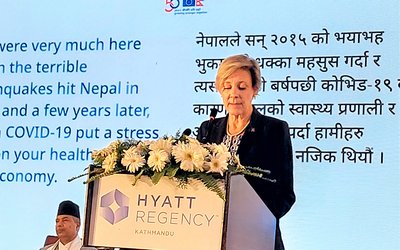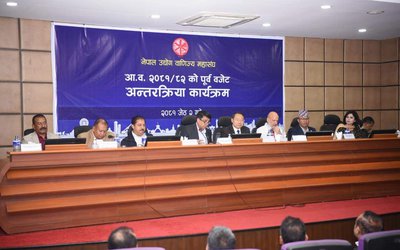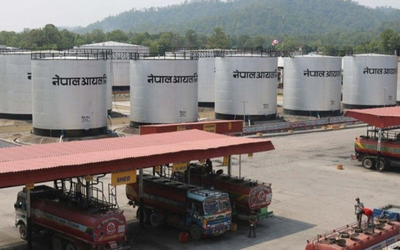
The election general meeting of the FNCCI will be held on 28th and 29th of Chaitra 2079. Senior Vice President Chandra Dhakal will automatically become the President, while it seems that there will be competition for the position of Senior Vice President. Three aspirants for the position of Senior Vice President are already campaigning for the election by announcing that they have become candidates.
Recently, according to a businessman, it took time to announce the team because the candidates for the senior vice president could not match the other candidates on the panel. There are also those who put the federation in the election field saying that to achieve the goal of "respected private sector prosperous Nepal" brought forward by the outgoing president "Vision 2030".
The main goal of an entrepreneur should be to increase production by smoothing mutual relations between workers and employers, keep interest rates stable, develop infrastructure and create an environment where energy can be supplied 24 hours a day at a cheap price.
New leadership should make the government realize that the heart of any country's economic success is the private sector. Sustainable development is also possible due to private investment and increase in productivity.
Studies conducted in 84 countries from 1960 to 2000 have shown that 41 percent of the various reasons for economic growth are due to increase in productivity. Overall, private sector investment creates more jobs, increases income, increases productivity, increases spending on health, housing and education, increases economic growth and provides advanced services to poor people, and thus alleviates poverty. Availability of advanced services to poor people and poverty alleviation. Nepal's foreign exchange reserves seem to have increased after the Nepal government banned the import of 10 'non-essential' items last April. However, its manufacturing sector has been plagued by power shortages and lack of investment, while government revenue collection has been weak, undermining Nepal's $40 billion economy.
Also, by mid-July this year, gross domestic product is expected to decelerate from the 5.8% growth recorded last year. Creating a favorable environment for investment and the trust of all stakeholders, including the general public, is the biggest challenge.
Also, businesses are protesting against high loan rates, agitating for a one-digit interest reduction compared to a year ago, and campaigning against loan defaults in district districts. Annual inflation is recorded to 7.88 percent in mid-February, but is still above the central bank's target of 7 percent.
In the context of Nepal, after the 90s, even though Nepal has moved towards trade liberalization and globalization, we have not been able to achieve any concrete achievements in the country's economic development, economic growth rate or poverty alleviation and inclusion.
Because of this, some may raise questions about the propriety of an open and market-oriented economic system in Nepal, but such issues have now become secondary. Nepali private sector should not be confused by the liberalization with Nepali context . Nepal cannot deviate from the market oriented economy. Therefore, rather than returning to the old market system, today's debate should be limited to identifying the existing mistakes and limiting the activities, order and speed of the reforms. Therefore, the process of trade liberalization should continue continuously.
In a country with a small economy like Nepal, there is no doubt that there will be a majority of small businesses, especially in the private sector. Although foreign investment is necessary and mandatory in such a country, domestic capital is mobilized to the maximum extent in industrial business. Also micro and small industries are run by women with a view to meeting local needs only.
In this way, small and medium entrepreneurs, including unorganized and procedurally registered entrepreneurs, seem to be the main and important land in terms of entrepreneurship in the country. Because of that, when it comes to the concept and implementation of public private partnership, it is necessary for the private sector to have the ability to understand, prioritize, and clearly explain their needs when discussing their needs rather than the government.
In the same way, the government capacity is successful only when there is amicable dialogue between the two parties and the government side also understands the commercial issue and has the commercialization technical capacity to deal with it.
In this context, it is necessary for the leadership of the federation to address these major problems in the country and to arrange effective regulation by reducing the excessive policies/rules and especially the unnecessary regulation or regulatory framework in the business.
The cost of regulation in less developed countries is three times higher than in developed countries.
Reforms in competition law, infrastructure development, strengthening international trade, reform of public institutions, improvement in business capacity, especially the financial market should be for the work of poor people, the necessary legal and regulatory system for the development of the financial sector should be reformed, risk reduction to encourage private sector activities, capacity It seems that there is a need to develop on the main issues of microfinance, such as increasing growth and external reach, encouraging innovation in the financial sector, bringing the beneficial effects of remittances to the poor people.
In this context, due to the ambiguity of the law, it is not possible to act in a way that matches the market situation quickly. More than this, the government agencies act more as regulators than as facilitators.
Also, the conflict of authority between the ministries and government agencies has also had a negative impact on the effectiveness of the government's promotional activities. There are also those who are of the opinion that the implementation of Vision 2030, which develops entrepreneurship by providing unsecured loans to small and medium businessmen, should be the main priority of the new leadership of FNCCI.
During the elections, it is natural to raise the issue of functional unity between the representatives of the private sector. The representative organizations of the private sector, the Federation of Nepalese Chamber of Commerce and Industry, the Confederation of Nepalese Industries and the Nepal Chamber of Commerce, said that there would be up to 90 percent unity in the operational agenda. The fact that collective unity is necessary for the overall welfare of the private sector and the development and expansion of the economy, the leadership of all the three organizations said that even though there are differences of opinion on a few issues, they will bring out one voice on most of the agendas. The current president of the Federation of Nepal Industry and Commerce said that the need for functional unity of the private sector has increased in the coming days and that the voice of the entire private sector was included in the vision paper prepared by the FNCCI.
All the private sector's objectives are economic prosperity, employment, double economic growth, reduction of trade deficit, even though they can cooperate in these objectives, they cannot be one. This is due to mutual egos, the arrogance of industrial groups and big industrialists as a separate group, everyone's access to the government, the competition to take photos with government officials, to join the delegation of government or head of state foreign visit, etc. could be the main reasons. "Forums like Nepal Business Forum (NBF) which deal with collective issues have either died or become inactive.
Although the working unity of the private sector can exert pressure on policy making, there is a battle of interests of industrialists and businessmen on various issue. From the customs to the customer's house, whether it is the rate of customs or the rate of tax .
What is Dalal Pujipati as a politician used to say while in opposition? They should be identified and said publicly, otherwise it would be like the case of 51 businessmen and 10 politicians as said by an entrepreneur in Jhapa, who is involved in loan clearance below 2 million rupees. Why is the private sector silent about their response or support?
Even though they say that they are ready to cooperate with the private sector in the maximum operational plan, it does not seem that everyone is able to do so. At the same time, it is not new that even though private sector representative organizations have played a major role in boosting the economic sector of Nepal, the government has not given priority to it.
It is not an exaggeration to say that giving a speech or opinion in public and secretly doing one's professional business work under the guise of a position is maladministration.
If the private sector moves forward as one, it can put pressure on every sector from policy. There is no doubt that the private sector has played an important role in the economic prosperity of the country.
Explanation and understanding is needed on : socialist-oriented economy in the constitution, three-pillar economic policy, post-Covid revival, monetary policy, reform of the economic sector, foreign investment, protection and promotion of products, maintaining uniformity in laws, small and medium and women entrepreneurship development, simplification of regulation, cost reduction process, digital use.
The election of the FNCCI should be able to send a message that the private sector can move forward unitedly in the coming days, including the transparency of the donations given in the elections. Currently, there is only remittance as the engine of the economy, and there is a possibility that the country's economy will collapse if there is a decrease in remittances, there is an urgent need for the federation to take initiatives with the government to encourage the export sector as another engine and for that, reduce the cost of funds for export-oriented industries.
In the past, if there was another parallel organization, it was seen as a divisive power. A divided power cannot exist, it does not benefit anyone and causes a loss. But competition is a major advantage. This is not a new concept. Those who are professionally associated with the private sector and are knowledgeable and concerned about it have always understood the need for an organization that truly represents the real stakeholders.
In the present situation, due to the lack of capital, there has not been a large investment in the field of industry and business. In such a situation, there should be increased concern, interest and curiosity to select a mature, coordinated and balanced candidate among those who have announced their candidacy for the position of senior vice president who becomes President autometically after three years.
- Nepal's 2081/82 Policy and Programme, Parliament Obstacles:Some Perspectives
- May 16, 2024
- Impact Of Indian Elections In Nepal
- May 03, 2024
- A Review Of The Handwritten “Gita Saar” Written By Krishna Prasad Lacoul In 1967-68 B.S.
- Apr 19, 2024
- “Thamel And Durbar Marg” Open 24 Hours: Strengths And Weaknesses
- Mar 31, 2024
- Nepal's Print Media Is Facing Challenges
- Mar 15, 2024

















